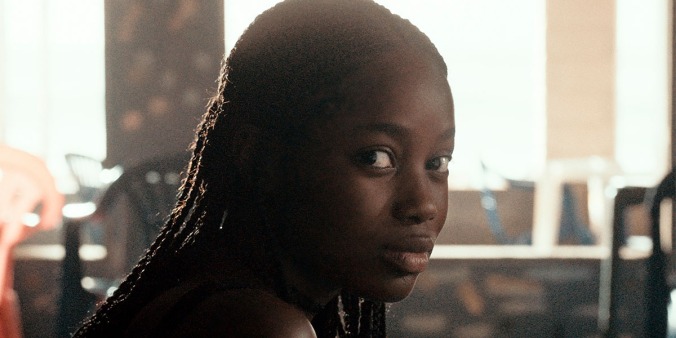Cannes winner Atlantics tells a richly imagined ghost story


In Mati Diop’s Atlantics, discontent reigns over the port city of Dakar, where a futuristic high-rise towers like some cruelly conceived lighthouse. When first introduced, Souleiman (Ibrahima Traoré), one of the construction workers of this building project, is agitating for three months of backpay; when he and his compatriots are rebuffed, he turns to his lover, Ada (Mama Sané), for comfort. Their relationship, though, is no more certain than his wages, as she’s betrothed to Omar (Babacar Sylla), a wealthy businessman who splits his time between Senegal and Europe, and who can provide Ada with a life of ease and comfort—which is to say, everything that Souleiman cannot. The two lovers make plans to rendezvous that evening at their usual haunt, a seaside nightclub. But when Ada arrives there at the appointed time, she learns that Souleiman and a group of other men have set sail for Europe on a pirogue. Soon, it’s revealed that their boat sank. There are no reported survivors.
Winner of the Grand Prix at Cannes this year, Atlantics holds the distinction of being the first film by a Black woman to ever compete for the Palme d’Or. This is no small achievement, especially since Diop, who’s still best known for her role in Claire Denis’ 35 Shots Of Rum, is here making her feature debut, with a film that’s a culmination of the actor-turned-director’s shorter work over the last decade. Her 2009 short “Atlantiques,” which centered on a group of men who attempt a perilous crossing to Europe, provides the conceptual starting point. Likewise, Atlantics’ tenor of inconsolable longing might be traced back to her immensely evocative, 45-minute Mille Soleils, which centered on Magaye Niang, the star of the 1973 Senegalese classic Touki Bouki, directed by none other than Diop’s uncle, Djibril Diop Mambéty.
Apropos a subtitle (A Ghost Love Story) the film has inconsistently sported since its premiere back in May, Atlantics is most interesting as a series of ethereal, allusive moments. Drawing on the documentary nature of her short films, Diop depicts Ada’s marriage to Omar with a particular attention to traditional customs and religious rites. But she also deploys a discordant soundscape, creating an air of unease that’s quickly reinforced by a mysterious fire in Ada and Omar’s marital bed, which detective Issa (Amadou Mbow) is brought in to investigate. Following news of his apparent demise, Souleiman is reportedly sighted at Ada’s wedding, and becomes Issa’s prime suspect for the arson, thereby putting Ada under suspicion when their former romance comes out. The detective, in turn, is affected by unusual spells of fatigue and heatstroke, while a kind of malady spreads among the women left behind by their drowned lovers.
It’s not until halfway through that Atlantics fully affirms its supernatural horror antecedents, recalling the gothic romance, tenebrous ambience, and eerie nocturnal wanderings of Jacques Tourneur’s 1943 masterpiece I Walked With A Zombie. The particulars of these developments are best left for discovery, but suffice it to say the film culminates in one of the most chillingly effective scenes of the year: a retribution for the corrupt developer responsible for withholding the workers’ wages. It’s indicative of the way Atlantics, like Tourneur’s film, conveys its sociopolitical (and colonial) implications within a richly imagined, lavishly textured story. Working with cinematographer Claire Mathon (who also shot another Cannes favorite, Portrait Of A Lady On Fire), Diop alternates between feverish, sun-soaked frames and suggestive low-light images. Likewise, Senegalese-born experimental artist Fatima Al Qadiri contributes an eminently enveloping score that melds effortlessly with Dakar’s natural soundscapes; it’s likely to linger long after the credits have rolled.
Diop does seem to rely on these sensuous pleasures to make up for the script’s various shortcomings. (The detective, for instance, eventually comes to feel like a transparent screenwriter’s device, since he’s at once indifferently developed and crucial to the story.) And her editing patterns in Atlantics are less distinctive than those in her shorts—films so committed to avoiding cliché that they could be occasionally inscrutable, though also productively protean. By the end, despite the considerable stylistic prowess demonstrated by Diop and her collaborators, Atlantics feels somewhat diffuse, building toward a decisive but familiar moment of closure for Ada—a note of affirmation to resolve the entire affair. Nonetheless, for Diop as much as for her lead character, Atlantics resounds with the promise of great things to come.